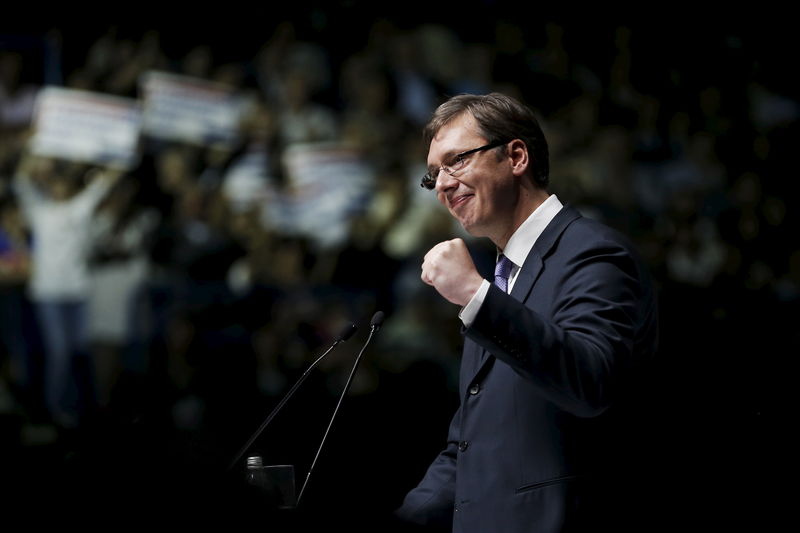By Adrian Croft and Ivana Sekularac
BELGRADE (Reuters) - Serbian voters were set to grant pro-western Prime Minister Aleksandar Vucic four more years in power on Sunday, but he will probably have to contend with a resurgent ultra-nationalist opposition demanding closer ties with Russia.
Aiming to push ahead with a bid for European Union membership, Vucic called the parliamentary ballot just two years after he became prime minister following a landslide election win for his conservative Progressive Party.
Vucic, a 46-year-old former hardline nationalist, has also promised a new drive to privatise loss-making state-run companies if he is re-elected, and pollsters expect him to win another absolute majority.
But Serbia's political picture is likely to be complicated by the re-emergence of Vojislav Seselj's anti-EU Radicals, which an austerity-weary electorate is tipped to return to parliament for the first time since 2012 as the third largest party.
Nationalist firebrand Seselj could become de facto leader of the opposition, less than a month after the U.N. tribunal in The Hague acquitted him of war crimes during the 1990s breakup of Yugoslavia.
There was a trickle of early voters in Belgrade.
Srdjan Zivkovic, a software engineer, who arrived at his polling station at the 7 a.m. (0500 GMT) opening time, declined to say how he would vote but said he expected Vucic's party to lose some of its power.
"It is not good to have one party with absolute power as is the case here now. They (the ruling party) are pressuring media, and their fight against corruption is just a charade," he said, adding his voice to critics who say Vucic's government has grown increasingly autocratic.
Milena Piljevic, 75, said she hoped the election would lead to higher living standards and more jobs for the young.
ULTRA-NATIONALIST RESURGENCE
Analysts think Vucic -- information minister during the final years of late President Slobodan Milosevic's rule -- will continue to govern in coalition with the second-biggest party, the Socialists, even though he does not need to, to broaden his base.
Vucic says he wants a clear mandate from Serbia's seven million people for reforms to keep EU membership talks launched in December on track for completion by 2019.
But the hitherto broad consensus in parliament in favour of EU membership is unlikely to survive Sunday's ballot.
Seselj's ultra-nationalists may resist concessions to Brussels, such as ending Serbia's constitutional claim to sovereignty over Kosovo.
The rise of the ultra-nationalists reflects discontent with the austerity policies Vucic has been forced to follow as the price of a 1.2 billion euro ($1.35 billion) International Monetary Fund loan agreement.
Cuts in public spending and subsidies, and tax rises, helped Serbia trim its budget deficit by nearly half last year. But the economy is recovering only slowly from recession and unemployment is around 18 percent.
Vucic will also strive to stay on good terms with traditional ally Russia, an important gas supplier, and Serbia does not plan to join NATO.

Polls close at 8 p.m. (7.00 p.m. BST) with first unofficial exit polls expected about an hour later.